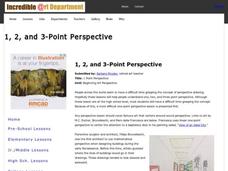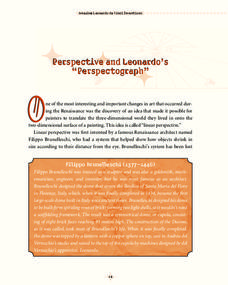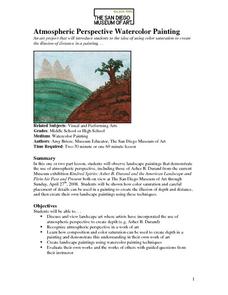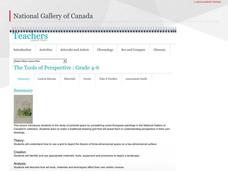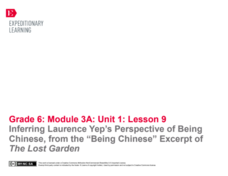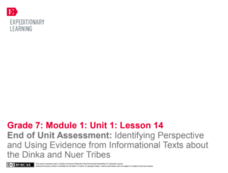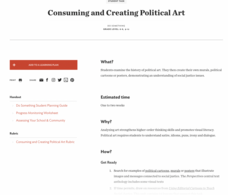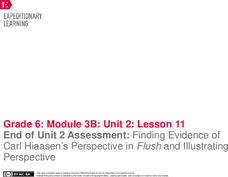National Gallery of Canada
Mastering One-Point Perspective
Cover one-point perspective through observation and practice. Class members examine several works of art that use one-point perspective, look at magazine images to find the vanishing points and horizon lines, and draw their own city...
Incredible Art
1, 2, and 3-Point Perspective
Introduce drawing students to perspective with a series of lesson that detail how to draft images in one-, two-, and three-point perspective. Each exercise includes step-by-step, illustrated directions and examples.
Curated OER
Art Criticism: Understanding Wayne Thiebaud's Salads, Sandwiches, and Desserts
Analysis consists of an understanding and interpretation of evidence and elements found in any number of expressive mediums. Upper graders critique the work of American Realist Wayne Thiebaud through a series of excellent guided...
The New York Times
Perspective and Leonardo’s “Perspectograph”
Filippo Brunelleschi's invention of linear perspective during the Renaissance was further developed by his apprentice, a young artist named Leonardo da Vinci. Now modern artists can give da Vinci's famous perspectograph a try with a...
EngageNY
Contrasting Perspectives: Should the Farmworkers in Esperanza Rising Go On Strike? (Chapter 12: "Los Esparragos/Asparagus")
Explore multiple perspectives through a jigsaw activity that will improve your pupils' understanding of the characters in Esperanza Rising as well as their understanding of strikes and human rights. Tapping into prior knowledge, and...
San Diego Museum of Art
Atmospheric Perspective Watercolor Painting
How do artists create the illusion of depth and distance on a flat surface? Young landscape painters explore techniques like color saturation and detail placement that create atmospheric perspective.
National Gallery of Canada
The Tools of Perspective
Make a study of perspective in the real world. Learners examine and discuss works of art that show examples of perspective before trying their own hands at it. Using a grid drawn on transparent paper, class members transfer a view from a...
EngageNY
Carl Hiaasen’s Perspective of Florida: Part 3
What is your perspective? Scholars read Florida: A Paradise of Scandals Excerpt 2 and look for unfamiliar words. They determine author perspective by completing Gathering Evidence of Hiaasen’s
Perspective: Part three graphic organizer...
EngageNY
Introducing The Lost Garden and Finding Evidence of Laurence Yep’s Perspective on What It’s like to Fit into Another Culture on Pages 66– 67 of Dragonwings
How does culture shape perspective? Pupils consider the question as they read an excerpt from Laurence Yep's autobiography, The Lost Garden. Using a graphic organizer, they gather textual evidence and make inferences about the author's...
EngageNY
Inferring Laurence Yep’s Perspective of Being Chinese, from the “Being Chinese” Excerpt of The Lost Garden
It's all about perspective! Using the resource, scholars read a third excerpt from Laurence Yep's autobiography, The Lost Garden. As they read, individuals complete graphic organizers using clues from the text to infer the author's...
Curated OER
Lesson: Possible Perspectives
Visual art is the inspiration for a creative writing activity focused on having learners write from different perspectives. They analyze the image Yellow Rain Jacket, picking out details to help their storytelling. They use the details...
EngageNY
Studying Conflicting Information: Varying Perspectives on the Pearl Harbor Attack, Part 2
Scholars take another look at Japan's Fourteen-Part Message. They then take turns adding ideas to sentence starters to create ideas about the different perspectives of government. To finish, groups mix and mingle to share their sentences...
EngageNY
End of Unit Assessment: Identifying Perspective and Using Evidence from Informational Texts about the Dinka and Nuer Tribes
Pupils consider the varying perspectives of people in different cultural groups as they read an informational text about the Dinka tribe of Southern Sudan and complete graphic organizers. They also respond to a constructed-response...
Curated OER
Eye-Popping Op Art
Students examine and discuss work of Hungarian artist Victor Vasarely, recognize visual components of Op Art, compare traditional Renaissance perspective with Op Art's illusion of three-dimensional space, and create original painting...
Curated OER
Art Basics Scavenger Hunt
Hand out this worksheet and lead your class on a scavenger hunt. Pupils look for examples of shape, form, balance, pattern, perspective, space, and depth. They draw and write about the examples they've found. A great resource to add to...
Curated OER
The Art of the Italian Renaissance
Feast your eyes on some of the most beautiful and important art of the Renaissance, including paintings, sculptures, and architecture. The slides take care to detail the characteristics of each art form, but the presentation really lends...
Teaching Tolerance
Community Arts Showcase
An art showcase encourages class members to explore the themes of social justice and tolerance. They create an original artwork, engage in group discussions, and journal writing. The art gallery also provides a chance for families and...
Teaching Tolerance
Consuming and Creating Political Art
A picture is worth a thousand words, but political art may be worth even more! After examining examples of political cartoons, murals, and other forms of public art, class members create their own pieces to reflect their ideals and...
Memorial Art Gallery
Learning to Look, Looking to Learn - Peeling Onions
Lilly Martin Spencer's "Peeling Onions" is the subject of a series of exercises that model for learners how to use the elements of art to read a painting. A series of worksheets focus viewers' attention on how Spencer uses color and...
Wordpress
Social Issues and Art Inquiry Project
Connect art to social issues with a extended inquiry project. Individuals or small groups select a social issue and a type of art to explore. They complete a KWL chart for both the social issue and the art strand and take time to create...
EngageNY
End of Unit 2 Assessment: Finding Evidence of Carl Hiaasen’s Perspective in Flush and Illustrating Perspective
The end is here. Scholars work independently on End of Unit 2 Assessment: Finding Evidence of Carl Hiaasen’s Perspective in Flush and
Illustrating Perspective. Learners use their graphic organizers and text to write to a prompt asking...
EngageNY
Illustrating Carl Hiaasen’s Perspective of Florida in Flush
Put it in a picture. Scholars complete the worksheet Illustrating a Scene Showing Perspective by completing a drawing to show the perspective they gained about Florida from the text Flush. The whole group carries out a critique of the...
EngageNY
Finding Evidence of Laurence Yep’s Perspective of the Police in Dragonwings
Perspective is everything. Using a graphic organizer, pupils determine Laurence Yep's perspective of the police in his novel Dragonwings. Additionally, scholars complete anchor charts to identify connotative language in the text.
English Worksheets Land
Identifying Narrative Perspective
First and third person points of view are the focus of a worksheet that has four practice passages that allow learners to identify the appropriate perspective. Then, they must respond and explain how they know.
Other popular searches
- Drawing Art Perspective
- Artistic Perspective
- Art and Perspective
- One Point Perspective Art
- Art Perspective Drawing
- Art Elements and Perspective
- Art Perspective
- 1 Point Perspective Art
- Art, Perspective Drawing
- Atmospheric Perspective Art
- Visual Art (Perspective)
- Visual Art Perspective



